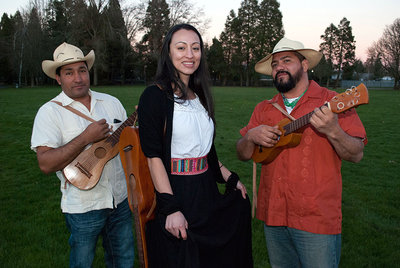
“I’m an activist,” says Angelita Chavez in her pico, a traditional handmade slip with red lining that shows when you pull the skirt up to dance the zapateado. “Here, I’m a dancer.”
A graduate student in UO’s political science department, Chavez dances to Son Jarocho, the traditional Mexican folk music of southern Veracruz that has Spanish, African, Indigenous and Mexican influences — think “La Bamba.” Besides the catchy chords and dance-ready beats, Chavez explains that Son Jarocho also functions as protest music. There are songs just for political events; for example, “El Presidente” is a call-and-response number about corruption.
Chavez is also a founding member of UO Fandangeuros, a group of students and community members that meets Tuesday and Thursday nights on campus to learn and play Son Jarocho on the jarana, an eight-stringed wooden instrument resembling a ukulele. If you’d rather dance, you can learn zapateado, the traditional foot-stamping dance of Son Jarocho. Chavez, who was born in Michoacán, Mexico, cofounded the group when she saw that this aspect of Mexican culture wasn’t very visible in Oregon.
In addition to weekly classes, UO Fandangueros is hosting two free jarana and zapateado workshops on Saturday, Feb. 28, and Sunday, March 1. The group is bringing in Maya Zazhil Fernandez, an instructor from Chicago, to teach the workshops, which will culminate in a free fandango celebration on 7 pm Saturday, Feb. 28, at the Campbell Club. The event will feature dance, music, singing and food.
“We want to bridge the gap between community and campus, and have a really traditional representation in an authentic way that’s respectful,” Chavez says. “It’s not just a way of sharing my background but empowering people.”
Son Jarocho music traditionally is played at a fandango, a term coopted by the ubiquitous movie-ticketing website. A fandango is actually an ancient form of a jam session, where one song can run more than an hour and the lines between performer and audience are nonexistent. Fandangueros play, sing and dance well into the wee hours of the morning. Son Jarocho has inspired contemporary bands like Ozomatli and Las Cafeteras, who played Feb. 4 at WOW Hall to a huge crowd, and also performed “El Presidente.”
UO Fandangueros began formal practices in September, but their roots began two years ago when Feliciano Vergara, the UO Fandangueros community adviser, bought several jaranas on a trip back to his home state of Veracruz. He emphasizes that the instruments are easy to play for beginners. Although Vergara didn’t attend fandangos when he was young, as his village of Las Garzas was far from where the sessions were usually held, he now hosts a fandango every Father’s Day at his home in Springfield, which usually lasts until two in the morning.
“I wanted to keep doing what my parents in Veracruz were,” Vergara says. “The purpose is to make community.”
UO Fandangueros meets 6 to 8 pm Tuesdays and 6:30 to 8:30 pm Thursdays in the UO Frohnmayer Music Building, room 207; free. All ages. Check out uofandangueros.wordpress.com for details. Maya Zazhil Fernandez will teach workshops noon to 4 pm Saturday, Feb. 28, and 1 to 5 pm Sunday, March 1, in Lillis Hall 112 on the UO campus. Fandango Jarocho will be 7 pm Saturday, Feb. 28, at the Campbell Club, 1670 Alder St.; free. All ages.